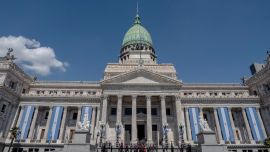Argentina is seeking an upfront payment representing a large portion of its future US$20-billion programme with the International Monetary Fund, as negotiations now focus on the size and timing of disbursements, according to people familiar with the matter.
The size of Argentina’s first disbursement has become the most important issue of negotiations at this stage, according to one person, who asked not to be named because talks are private. The exact amount Argentina is requesting is unclear, and no final decision has been reached as negotiations are ongoing. IMF loans usually are disbursed gradually over several years, with countries needing to meet certain benchmarks over time.
Giving Argentina more money sooner, known as frontloading, is a key point in the talks as the country aims to strengthen its international reserves, with the Treasury planning to use some of the IMF funding to pay down its debt with the Central Bank under the so-called non-transferable notes. The repayment would allow Argentina to recapitalise its Central Bank.
Argentina’s Economy Ministry didn’t respond to a request for comment about how much money the country is seeking up front in the programme. The IMF’s press office referred to remarks by Chief Spokeswoman Julie Kozack Thursday that the pace and size of disbursements are still being negotiated.
“As with all of our programmes, disbursements will come in tranches over the life of the programme. But the exact phasing and the size of each tranche is also, of course, part of the discussions that are underway,” Kozack said.
Investors are keenly watching this detail of the programme after Economy Minister Luis Caputo confirmed Thursday morning the deal will total US$20 billion, which Bloomberg News had previously reported.
Before the separate remarks by Caputo and Kozack, Morgan Stanley said earlier on Thursday that its base case is for the programme to disburse US$5 billion up front in 2025, according to a report led by economist Fernando Sedano. The bank also expects another US$5 billion from other international financial institution.
Caputo added that the IMF’s executive board could take weeks to approve a new loan, without providing a specific timeline. He also said that funds combined from the IMF, World Bank, Inter-American Development Bank and regional bank CAF would put Argentina’s Central Bank reserves near US$50 billion. Today, reserves stand at US$26.2 billion.
Negotiations around frontloading have dominated Argentina’s past two IMF agreements in 2018 and 2022 that failed to stabilise the economy.
In 2018, the IMF agreed to give Argentina more money up front and boost the total size of the programme to US$57 billion, a move that ultimately squandered billions after a presidential election veered the deal off track and a currency sell-off. Four years later, the next government received US$9.8 billion in the first disbursement from the IMF as part of a total US$45-billion deal to refinance the prior one. A few months before the 2023 presidential election, Argentina secured US$7.5 billion from the IMF by combining two disbursements into one even as that administration repeatedly broke the programme’s rules.
related news
by Jorgelina do Rosario & Eric Martin, Bloomberg






















Comments